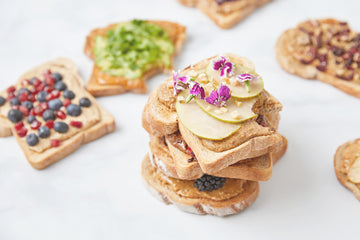
From our very first batch of nut butters, we’ve always aimed for the perfect balance of roastiness, saltiness, and sweetness.
During his time as a Peace Corps Volunteer in Zimbabwe, founder Mark Overbay had a revelatory experience: peanut farmers would roast and grind their harvest into a think paste and sweeten it with a touch of honey, creating a fresh peanut butter unlike any he'd ever had. When he returned home, he sought to recreate this experience with ingredients local to the Carolinas. A grandson of avid beekeepers, Mark has appreciated the seasonal nuances and incredible flavor of raw wildflower honeys since early childhood, and when Big Spoon Roasters was just an idea, he planned to work with local and regional beekeepers to provide a touch of sweetness to his handcrafted nut butters. He knew that, in addition to its delicious flavor, honey also acts as a natural preservative, helping prevent oxidation of the freshly milled nuts and their oils.
We also choose to use local honey to support the critical efforts of local beekeepers. The importance of bees and their role in pollination and farming cannot be overstated, and beekeepers play a critical role in keeping these populations alive and available to pollinate crops. Basically, without bees, we have no food. As our honey broker explains, "We are all connected. Without the bees, there are far fewer tasty things for us to eat. Without the bees and other insects, there are not songbirds and beautiful flowers. A life rich with diversity is a life that is rich in so many ways!"
This is why we are committed to supporting these local beekeepers, who in turn support our local bee population, even though this means we may never be able to be non-GMO certified. For honey to receive non-GMO certification, the bees must have a 4-mile fly radius completely unencumbered by non-organic farmland. Because of the nature of US farming, this means that there are almost no officially non-GMO or organic honeys in the USA. Rather than sourcing honey from outside the US or trekking it in from one of the few remote areas in the country, we opt to keep it local. Anthony Maxfield, the head of the Hawaii Beekeepers Association, explains that organic honey, "is not really the best honey. The best honey you can get is from where you live."
A lot of our honey comes to us from Cannady Apiaries in Harrells, NC. Their bees spend part of their life pollinating watermelons, blueberries, and other crops, and the other part in swampy and wild areas where they collect pollens from wildflowers, gallberry shrubs, tulip poplars, and other trees. The resulting honey has an incredibly complex, floral flavor that adds additional depth to our nut butters and snack bars. Raw wildflower honey has also been linked to many health benefits, including increased athletic performance (ask Mike Wardian), improved allergies, strengthened immune systems, enhanced memory, and improved sleep.
Interested in more ways to support the bee population? Here are some tips from our honey provider:
1. Buy more local and pesticide-free food and clothing (biodynamic, sustainable). There is little doubt now about the harm that pesticides, especially neonicotinoids, are doing to honeybees and other pollinator populations (bumblebees, butterflies, moths, etc). In every country that neonics have been introduced, mass bee deaths have followed. They are more deadly than DDT and affect honeybees and other insects by weakening their immune system, making them more susceptible to viruses, parasites and pathogens. Here is a great article if you’d like to learn more about pesticides and our pollinators: http://ecofarmingdaily.com/pollinators-in-peril/
2. Use natural methods to prevent pests in your garden and home. Whatever you do to one “pest”, you can potentially be doing to the honeybee and other pollinators. Stop and think before spraying chemical pesticides, broadleaf herbicides, and fungicides at home. Use pests to fight pests! Provide habitats like clover for predatory pests like wasps, spider mites, praying mantis and ladybugs. Use neem oil and diatomaceous earth, still being concerned to use sparingly because it will kill beneficial and non-beneficial pests. But they do not have the half-life that chemical pesticides have; they wash off easily. Here is a good website for specific natural ways to combat a whole host of pests: https://learn.eartheasy.com/guides/natural-garden-pest-control/
3. Plant pollinator-loving trees, shrubs, and flowering perennials and annuals. If possible, add a fresh water source for them too.
4. Balance the desire for a perfect lawn with the needs that pollinators have for those weeds’ flowers to feed them, making sure to be mindful of when the “weeds” are blooming before cutting. One can gain so much pleasure from just watching these pollinators out in your “imperfect” lawn!
5. Support one of the organizations that are fighting for beekeepers and pollinators. You can do this painlessly through Smile.amazon where Amazon will donate a portion of what you buy to your selected charity, like the pollinator stewardship council. Or make a donation to or get involved with one of these nonprofits: http://pollinatorstewardship.org http://pollinator.org https://spikenardfarm.org


